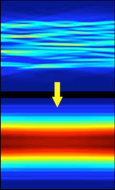Optoelectronics and Lasers

From High-Power Lasers to Microlasers
Starting with improving laser beam quality and increasing brightness of high-power laser systems for high-temperature heating of plasma and industrial solid-state lasers we now moved to microlasers based on cholesteric liquid crystals.

High Power Semiconductor Lasers
Broad-area laser (BAL) diodes are useful for pumping high-power fiber lasers and amplifiers, however they suffer greatly due to free-carrier induced self-focusing causing beam filamentation and thus reduced beam quality. The Institute is exploring methods of on-chip, integrated, continuous filtering in order to suppress filamentation in broad-area lasers in order to relieve the pumping limitations on high-power fiber lasers/amplifiers that BALs impose. A custom Beam Propagation Method code to design gain, current, and index structures that preferentially and continuously filter the high spatial frequency light characteristics of filamentation before it experiences large amounts of gain.

Room Temperature Thresholdless Lasers
Development of Room-Temperature Near-Thresholdless Nanolasers for optical telecommunications and optical sensing. Reducing the threshold is vital for the scalable integration of multiple laser devices on a chip. We use advanced nanophotonics concepts to design and fabricate better, more integrable, and more efficient laser devices.
Semiconductor Epitaxial Structures for Lasers and Optical Detectors
Molecular beam epitaxy is used to construct crystal structures, e.g., quantum wells and quantum dots. These types of structures are engineered for specific optical properties such as particular emission wavelengths or enhanced absorption efficiencies. These types of structures are engineered for specific optical properties such as particular emission wavelengths or enhanced absorption efficiencies.
